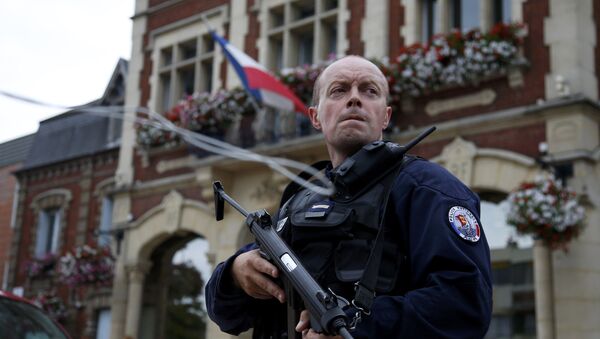Adel Kermiche was one of the two attackers that stormed the church in the small town of Saint-Etienne-du-Rouvray, before slitting the throat of 86-year-old priest Jacques Hamel.
Following a number of major terrorist attacks in France over the past 18 months, people have begun to question how the 18-year-old, who is facing a terror trial, was able to carry out the attack, which terror group Daesh (also known as ISIL) has since claimed responsibility for.
#BREAKING 1 #Normandy attacker identified as 19-year-old Adel Kermiche, on watch list after 2 failed attempts to reach Syria. #ISIS
— Natasha Fatah (@NatashaFatah) July 26, 2016
Paris prosecutor Francois Molins said Kermiche first came to the attention of authorities in March last year when a member of his family notified authorities that he was missing.
He was then tracked down in Germany, while attempting to use his brother's identification card to travel to Syria.
After being returned to France, he then fled again, this time to Turkey, where he was arrested once again and held in custody until March this year.
One of the #ISIL "knife men" in attack @ Normandy church had an ankle tracking device; negotiated to turn it off for a couple hrs during AM.
— aeronautic1 ن (@aeronautic1) July 26, 2016
Upon the terms of his release, Kermiche was fitted with an electronic bracelet, which reportedly allowed him to leave his house on weekdays for between four and five per day.
While Keemiche's uncle said he thought the 18-year-old "was going back to a normal life," others held different views, with an unknown acquaintance telling Le Parisien newspaper that Kermiche was a "ticking time-bomb."
Critics Slam Government Laws
As French President Francois Hollande defended measures that allowed Kermiche to leave his home for a certain period during the day, others have heavily criticized the government, accusing them of negligence.
"It should not be possible for someone awaiting trial on charges of having links to terrorism to be released," Frederic Lagache, deputy chief of France's police union said.
Kermiche, #Normandy killer, "only spoke about religion," remained in an IS bubble despite family doing "everything to try and get him out".
— Kyle W. Orton (@KyleWOrton) July 27, 2016
This criticism was backed up by Mohammed Karabila, leader of the regional council of Muslim worship in Haute Normandie, in the area in which the attack took place.
"How could a person wearing an electronic bracelet carry out an attack? Where are the police?" he asked.
#BastilleDay is the 7th Terror Attack in France in 18 months.
— CajunAsian (@RiflemansCreed) July 15, 2016
All the security cameras and gun control laws did nothing!!#NiceAttack
The latest attack has led to questions about the capability of France's law enforcement services to prevent further terror attacks in the country.
Despite introducing a series of laws aimed at cracking down on jihadists and potential terrorists, critics of the government say the measures haven't gone far enough, and have called on Hollande to place to grant more power to security and law enforcement agencies.


